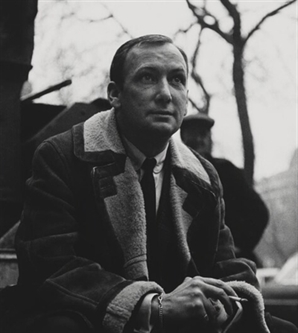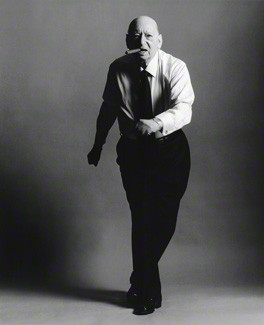
Jeeves and Wooster is a British comedy-drama television series adapted by Clive Exton from P. G. Wodehouse's "Jeeves" stories. It aired on the ITV network from 22 April 1990 to 20 June 1993, with the last series nominated for a British Academy Television Award for Best Drama Series. Set in the UK and the US in an unspecified period between the late 1920s and the 1930s, the series starred Hugh Laurie as Bertie Wooster, an affable young gentleman and member of the idle rich, and Stephen Fry as Jeeves, his highly intelligent and competent valet. Bertie and his friends, who are mainly members of the Drones Club, are extricated from all manner of societal misadventures by the indispensable Jeeves.

Johnny Speight was an English television scriptwriter of many classic British sitcoms.

Lew Grade, Baron Grade, was a Russian-born British media proprietor and impresario. Originally a dancer, and later a talent agent, Grade's interest in television production began in 1954 when he founded the Incorporated Television Company to distribute programmes, and following the success of The Adventures of Robin Hood decided to focus on bringing them to the American market. Grade had some success in this field with such series as Gerry Anderson's many Supermarionation series such as Thunderbirds, Patrick McGoohan's The Prisoner, and Jim Henson's The Muppet Show. Later, Grade invested in feature film production, but several expensive box-office failures caused him to lose control of ITC, and ultimately resulted in the disestablishment of ATV after it lost its ITV franchise.

The Broadcasting, Entertainment, Communications and Theatre Union (BECTU), formerly the Broadcasting, Entertainment, Cinematograph and Theatre Union, became a sector of the Prospect trade union in the United Kingdom on 1 January 2017 following the merger of BECTU with Prospect. It has approximately 40,000 members who work in broadcasting, film, theatre, IT, telecoms, entertainment, leisure and interactive media.

The British Film Institute (BFI) is a film and television charitable organisation which promotes and preserves film-making and television in the United Kingdom. The BFI uses funds provided by the National Lottery to encourage film production, distribution, and education. It is sponsored by the Department for Culture, Media and Sport, and partially funded under the British Film Institute Act 1949.

Nineteen Eighty-Four is a British television adaptation of the 1949 novel of the same name by George Orwell, originally broadcast on BBC Television in December 1954. The production proved to be hugely controversial, with questions asked in Parliament and many viewer complaints over its supposed subversive nature and horrific content. It starred Peter Cushing, Yvonne Mitchell, Donald Pleasence and André Morell.

Charles Ainslie Crichton was an English film director and editor.

Eric Richard Porter was an English actor of stage, film and television.

The Association of Cinematograph, Television and Allied Technicians (ACTT) was a trade union in the United Kingdom which existed between 1933 and 1991.
Thelma Connell was a film editor from England. She was known for her work on thrillers and mysteries, and she often collaborated with Frank Launder, Sidney Lumet, and Lewis Gilbert.
NVTV, also known as Northern Visions Television, is a local community television station based in the city of Belfast. It is operated by the Northern Visions media and arts project, and although some staff are employed by the station, most involved are volunteers. NVTV is now the only local community station in Northern Ireland.
Wolf Peter Rilla was a film director and writer of German background, who worked mainly in the United Kingdom.

The Film and TV Charity, formerly the CTBF, is the leading UK charity for people who work in the film, cinema and television industries, whose careers cover all aspects of pre-production and beyond, from script to screen and in a variety of roles.
Sidney Henry Cole was a British film and television producer. Earlier in his career he worked as a film editor.
Alan Sapper was a British trade unionist.

Raymond Francis was a British actor best known for his role as Detective Chief Superintendent Tom Lockhart in the Associated-Rediffusion detective series Murder Bag, Crime Sheet and No Hiding Place. He played the role of Lockhart in these series from 1957 to 1967, and the character was one of the first recurring television detectives.
Joan Kemp-Welch was a British stage and film actress, who later went on to become a television director. After making her stage debut in 1926 at the Q Theatre, Kemp-Welch made her film debut in 1933 and appeared in fifteen films over the next decade largely in supporting or minor roles. Occasionally she played more substantial parts as in Hard Steel and They Flew Alone.
The BFI Production Board (1964-2000) was a state-funded film production fund managed by the British Film Institute (BFI) and "explicitly charged with backing work by new and uncommercial filmmakers." Emerging from the Experimental Film Fund, the BFI Production Board was a major source of funding for experimental, art house, animation, short and documentary cinema, with a continuing commitment to funding under-represented voices in filmmaking.

Kay Mander was a British non-fiction film director and shooting continuity specialist.
Red Skirts on Clydeside, produced in 1984, is the fifth documentary film made by the Sheffield Film Cooperative. It follows the process of rediscovering women's histories, focusing on the Glasgow Rent Strikes of 1915 and four of the women involved: Helen Crawfurd, Agnes Dollan, Mary Barbour, Jean Fergusson.











